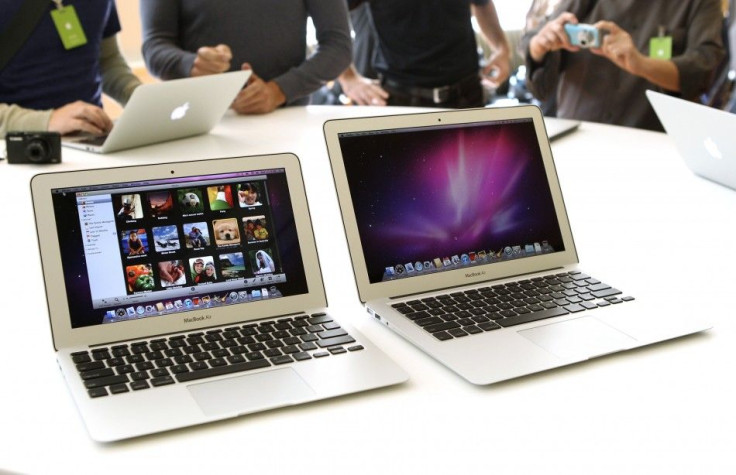Apple MacBook Air first, iPhone 5 later

Apple is slated to launch upgraded versions of its ultra-thin MacBook Airs equipped with Intel's Sandy Bridge chip architecture with laptops going into production this June.
Apple Insider quoted Concord Securities analyst Ming-Chi Kuo - who's reputed to provide accurate forecasts of Apple's hardware plans - as saying that Apple has placed orders for 380,000 Sandy Bridge-based 11.6 and 13.3-inch MacBook Airs for June.
Kuo also confirmed that 290,000 of the ordered laptops are of the 11.6-inch model, which is more in demand because of the attractive $999 price tag.
Apple unveiled its next generation of MacBook Airs in October 2010. The MacBook Airs were launched in 11-inch and 13-inch models. The new laptops set a new benchmark in the industry as they sported ultra-thin features. The 11.6-inch MacBook Air weights a mere 2.3 pounds while the 13.3-inch model weighs about 2.9 pounds.
The 11.6-inch model is incredibly thin measuring 0.11-inches at its thinnest point and 0.68-inches at its thickest. Both the models use solid state storage and offer up to seven hours of battery life and 30 days stand-by time.
The 11.6-inch MacBook Air comes in two configurations powered by a 1.4 GHz and 1.6 GHz Intel Core Duo chips while the 13.3-inh model has 1.86 GHz and 2.13 GHz Intel Core Duo chips.
However, the report by analyst Kuo suggests that the new MacBook Airs will be powered by Intel's 32-nanometer Sandy Bridge chip architecture. The ultra-low-voltage Corei5 and Corei7 chips sport between 3MB and 4MB of Smart Cache and support up to 8GB of internal memory. The Intel Core Duo chips in the existing Mac Book Airs use the L2 cache.
Earlier reports from Apple suppliers in the East had confiremd that Apple is due to launch MacBook Airs on the Sandy Bridge architecture in May. It had said that the existing suppliers for MacBook Air -- Quanta Computer that is solely responsible for assembly, Catcher Technology supplying casings, Auras Technology a main supplier of thermal modules, Shin Zu Shing supplying hinges, and Simplo Technology and Dynapack supplying batteries -- were still on board. However, none of the makers had confirmed if they were part of the Sandy Bridge-based MacBook Air production.
In February, Apple updated its MacBook Pro line-up of laptops with Intel Sandy Bridge Core i5 and i7 processors Thunderbolt I/O, AMD Radeon HD Graphics and FaceTime HD camera. Also in May, Apple announced upgrades to its iMac line-up of desktops. The upgrade included Sandy Bridge chips, Thunderbolt I/O, new Radeon HD graphics processor and in-built FaceTime HD camera.
It is surmised that Thunderbolt I/O will also come to MacBook Airs. The Light Peak/Thunderbolt allows users to connect multiple devices with a single cable and transmits data at a speed of up to 10Gbps from various devices. Apple states that the Thunderbolt I/O technology allows a user to daisy-chain up to six new peripherals - such as the Promise Pegasus RAID or LaCie Little Big Disk1 - plus an Apple LED Cinema Display.
Other reports suggest that Apple will refresh its MacBook Air with voice recognition support. It is rumored that the recently released iOS 5 has voice recognition features.
The possibility of an upgraded MacBook Air also arises because of the recent unveiling of Mac OS X which brings more than 250 new features to the OS. Some of the key features which Apple highlighted at WWDC included Airdrop which enables users to send files wirelessly, Full-screen apps, multi-touch gestures to be used on Multi-Touch trackpad, FaceTime, enhanced photo booth, launchpad and resume.
The Mac OS X Lion is priced at $29.99 and will be available only on the Mac App Store as a 4GB download. However, Apple has not announced the actual release date of the new OS.
Recently, Intel revealed its strategic plans at the Computex Taipei trade show where it outlined plans to introduce the Ultrabook category of processors. These chips will power ultra-thin laptops measuring 20mm less in thickness and will bring tablet-like features on the notebook. Asustek's UX21 mimics this concept as the laptop is about 17mm at its thickest point. The device is powered by Intel Core i7 chips. Asustek is expected to price the laptop $100 cheaper than the MacBook Air.
While media has been focusing on the unrevealed iPhone 5 plans, Apple seems to be quietly working on MacBook Airs.
© Copyright IBTimes 2025. All rights reserved.




















